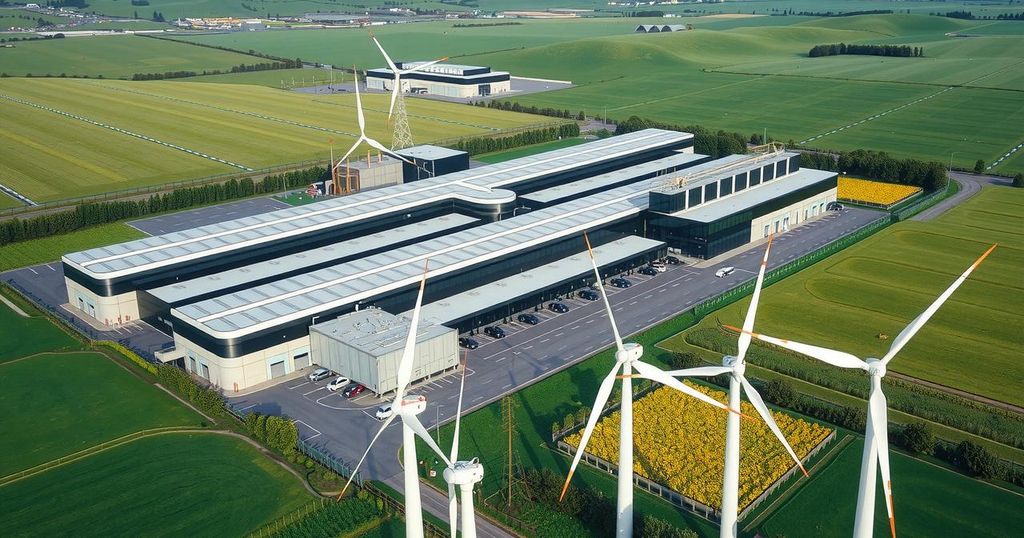AI Chip Manufacturing’s Impact on Climate Progress in East Asia
Greenpeace East Asia reports a 350% increase in electricity use for AI chip manufacturing since 2023, stressing the environmental impacts in East Asian countries. The reliance on fossil fuels threatens climate targets, with electricity demand expected to increase significantly by 2030. Concurrently, an AI-generated climate change denial paper raises concerns over research integrity and objectivity, prompting calls for stronger regulations in AI use.
A recent report by Greenpeace East Asia has highlighted a staggering 350% increase in electricity consumption rates for artificial intelligence (AI) chip manufacturing since 2023. This surge in demand poses significant challenges for climate targets in East Asia, where countries like Taiwan and South Korea are prominent semiconductor manufacturing hubs. The growing reliance on fossil fuels for power generation to meet this demand threatens the region’s environmental goals.
The report indicates that semiconductor factories in East Asia are increasingly using fossil fuels, which has raised concerns about the potential environmental impact. The collective emissions from AI chip production across the Asia Pacific, especially in Southeast Asia, could hinder efforts to achieve sustainability targets. The manufacturing of AI hardware is notably energy-intensive, and many power grids in the region continue to depend on fossil fuels due to limited progress in adopting renewable energy sources.
Electricity consumption for AI chip manufacturing is projected to rise dramatically, potentially increasing by 170-fold before the decade concludes. This growth could lead to electricity demands equaling the entire consumption of Ireland and surpassing smaller nations. The trend suggests that several Asia Pacific countries are resorting to constructing new fossil fuel plants to support their semiconductor operations, with Taiwan at the forefront.
Despite the easy appeal of fossil fuels, the Greenpeace report underscores the adverse environmental consequences and the risk to climate commitments. To address these issues, the organization advocates for an industry-wide shift towards renewable energy, encouraging hardware manufacturers to invest in solar and wind power. The report specifically mentions major U.S. chip companies like Nvidia and AMD, urging them to acknowledge the ecological effects of their supply chains in Asia.
Separately, researchers have criticized an AI-generated paper that promotes climate change denial. The paper, produced by Grok 3 AI, has gained notoriety among climate skeptics, claiming neutrality while lacking transparency about its authorship or methodology. Notably, co-authors involved in developing the paper have links to the fossil fuel industry, undermining claims of unbiased research.
Critics assert that the AI model lacks genuine reasoning abilities, leading to misleading claims. The paper does not provide necessary details on the prompts used for AI data analysis, which raises questions about the reliability of its conclusions. Furthermore, the absence of a thorough review process has led experts to express concern over the integrity and credibility of the findings, casting doubt on AI’s role in producing objective science.
As AI technologies evolve, experts warn about the risks they pose, particularly concerning misinformation. Reports from the World Economic Forum indicate that the potential misuse of generative AI could have serious implications across various sectors, including healthcare. To mitigate these risks, experts advocate integrating enterprise blockchain systems with AI to ensure data accuracy and security, ultimately fostering greater innovation and legal compliance in the AI landscape.
In conclusion, the rapid escalation of electricity consumption due to AI chip manufacturing in East Asia poses significant threats to climate sustainability targets. While the reliance on fossil fuels continues to rise, there is an urgent need for the industry to transition towards renewable energy solutions. Moreover, the emergence of AI-generated literature denying climate change highlights the susceptibility of research integrity amidst advanced technologies. Therefore, it is crucial to implement stringent measures and leverage innovations such as blockchain to uphold data quality and promote responsible AI use.
Original Source: coingeek.com




Post Comment